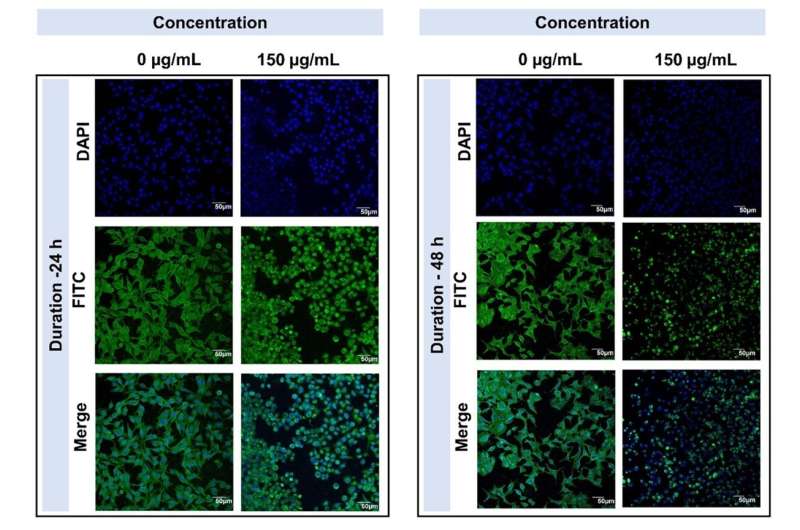

The main challenges associated with existing lung cancer drugs are severe side effects and drug resistance. There is hence a constant need to explore new molecules for improving the survival rate and quality of life of lung cancer patients.
In Indian Ayurvedic medicine, black cardamom has been used in formulations to treat cancer and lung conditions. A team of researchers from the NUS Faculty of Science, NUS Yong Loo Lin School of Medicine, and NUS College of Design and Engineering studied the scientific basis behind this traditional medicinal practice and provided evidence of the cytotoxic effect of black cardamom on lung cancer cells. The research highlighted the spice as a source of potent bioactives, such as cardamonin and alpinetin, which could be used in the treatment or prevention of lung cancer. The study is the first to report the association of black cardamom extract with oxidative stress induction in lung cancer cells, and compare the spice’s effects on lung, breast and liver cancer cells.
The findings could potentially lead to the discovery of safe and effective new bioactives which can prevent or cure cancer formation. The research was first published in the Journal of Ethnopharmacology in December 2021.
Delving into the science behind Ayurveda
The research provides the verification of ethnomedical uses of black cardamom for its effect on lung-related conditions. Black cardamom is typically used in Asian households in rice preparations, curries and stews either as a whole spice or in powdered form. The spice is also prescribed in Indian Ayurvedic medicine in powder form where it is used for conditions such as cough, lung congestion, pulmonary tuberculosis, and throat diseases. In addition, black cardamom has been used in medicine formulations for cancer patients in some rural and tribal cultures in India.
In the NUS study, black cardamom fruits were powdered and sequentially extracted with five types of solvents, including organic solvents and water. This allowed the researchers to evaluate the best solvents to extract the most potent actives in the fruit. The various types of black cardamom extracts were then tested for their cytotoxicity against several types of cancer cells. These included cancer cells from the lung, liver and breast. Among the three types of cells, lung cancer cells were least likely to survive when tested with the black cardamom extracts.
“The study lays the foundation for further study on whether consuming black cardamom can prevent, or help as a therapeutic for, lung cancer. Previous research papers on black cardamom’s effects on cancer were preliminary and did not link research findings with the use of black cardamom in traditional medicine. There was also not enough screening done using different cancer cells to understand which cancer cells were most responsive to black cardamom extracts,” said Pooja Makhija, a doctoral student from the Department of Chemistry at NUS Faculty of Science.
The sequential extraction method using hexane followed by dichloromethane produced a black cardamom extract that was most effective against lung cancer cells. Dichloromethane extract treated cells were found to be killed mainly by apoptotic pathway where the measure of live cells, dropped to less than an average of about 20 percent after 48 hours of contact with the black cardamom extracted using dichloromethane. Cell death was caused by apoptosis with cells displaying morphological changes, such as shape distortion and shrinkage, increased oxidative stress, and a failure in DNA damage repair.
After running the black cardamom extract though liquid chromatography mass spectrometry analysis, the researchers linked the presence of two well-researched bioactives, cardamonin and alpinetin, to the cytotoxic potential of black cardamom.
“With black cardamom being commonly used as an important spice in cooking, further in-depth investigation about its impact on lung cancer progression in the pre-clinical models can provide strong evidence in support of the “food as medicine” philosophy of Hippocrates that has been neglected to great extent in the present day,” said Associate Professor Gautam Sethi from the Department of Pharmacology at the NUS Yong Loo Lin School of Medicine, who was a collaborator for the research.
Potential applications for cancer research
Source: Read Full Article